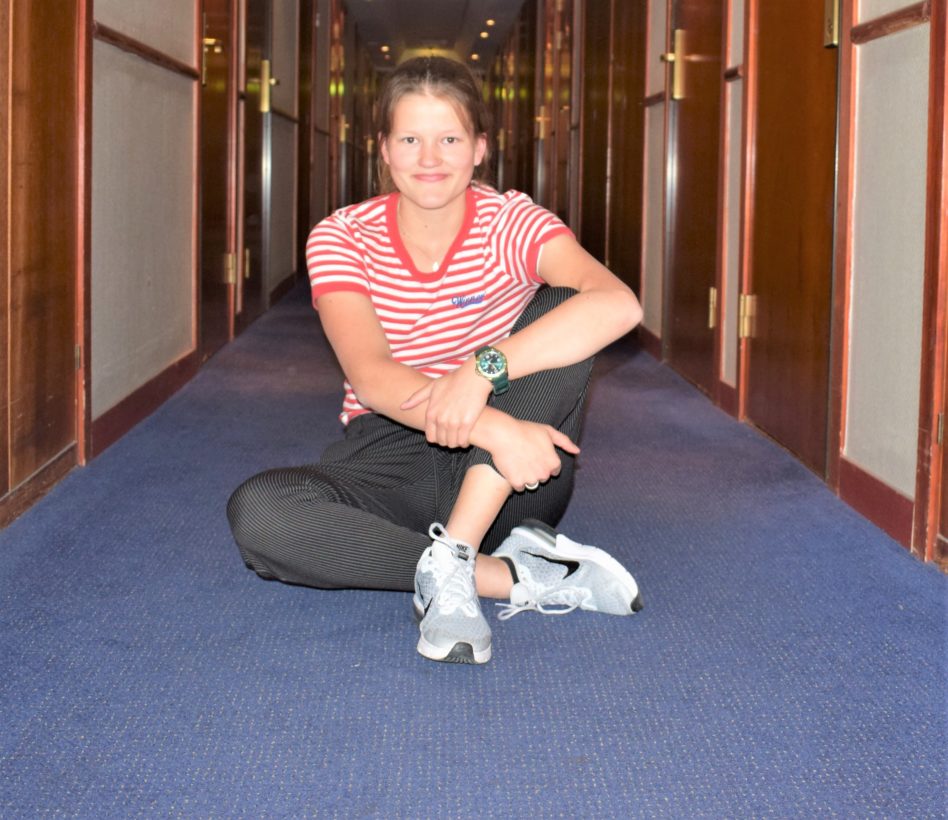Centaine Du Toy van Hees from Netherlands
Who is ordinary and normal Centaine? What do you like to do in your free time?
I graduated four months ago and so it’s been a long time since I had an “ordinary” day. I love to do sports and stuff. I play tennis a lot. I like to play music, I play the piano and guitar, I used to play in School but… not anymore.
I’m assuming you started these things when you were younger, so when did Science enter your life?
I always was the reading type, when I was younger in primary school I would read 20 books a week. It was crazy, I was always reading! I also liked doing normal stuff, but I’m interested in everything around me. I’m very concerned with people. I’m Christian, it’s not that I’m going to church every week but I grew up with things like “take care of each other” and stuff…
How did you hear about the SJWP competition?
I had to do a research project like all students have to do in the Netherlands. It takes almost a year and you start in your fifth year of high school. So I did my blue battery project and I won the competition at school where there is this special foundation that gives the winner money. It’s pretty serious. I did my research at Wetsus, where the National Organiser for SJWP Netherlands works and they said I should apply for the competition.
What were some of the bigger challenges you faced in your project?
Big challenges… Hm, I mean, I had this plan and I just did it and I was like “let’s see if it will work!”. I was going to develop a new membrane and it was just a lot of waiting for results and the performance of it. If it was a bad membrane, I would probably have done more research to make it better. But after a few tries it worked so I didn’t have to. You can always improve but for my project and how broad it had to be, it was enough.
Did you have specific person or mentor that helped you along the way?
Normally, you get assigned to a mentor kind of person in school, one of the teachers. But he wasn’t the one really helping me. Instead, at Wetsus the professor who is the head of the blue energy projects and he was my supervisor and helped me. If I had any kind of questions I could ask him anything I wanted to know.
What is most important about having a mentor?
It depends what kind of research you are doing. What I was doing is kind of a developed field. It already existed, I was only trying to improve it. But if you start something from zero and there’s nothing, not even basic knowledge, you need a teacher. It can really help you along the way and when you are unsure, it’s really helpful.
What has been the best moment through the competition so far?
I don’t know to be honest. It’s only the second day, so… But I really like the fact that there is so many different cultures and people. Everyone is so nice. Nobody knows anyone, everyone is new so there are no separated groups or anything. Everyone is with everyone. I really like the diversity and the fact that when you are living your life and doing your normal stuff, you forget that you can make a difference. Everyone that came here tried to and probably did. Normally, when people hang out they are not focusing on stuff that matters.
Before I came here I really didn’t know what to expect. Was everyone going to be very competitive and excluding themselves in order to prepare for the interviews? But it is totally not like that. Everyone is just really nice and want to hang out.
How do you think the SJWP competition has impacted you?
Along the way you are always presenting and doing your own thing. I think normally you are just one in the mass, you know, and this experience really opened my eyes to realize that everyone can contribute and make this world a better place.
If you could communicate to every single person in the world under 35 at the same time. What would you like to say?
Oh my god, that’s really deep… Well, looking at society today what really bothers me is everyone is so focused on their own. I think it’s just so much more important to look at others and what’s around and appreciate what we have. Let’s say we have the time to save it, we actually need to appreciate what we have because look back just 50 years. There were so many more animal species only nobody lived around them to notice. Now we’re like “Oh no, they’re gone”. So I think just really look around. Appreciate what’s around and if you can, try and make the world a better place instead of trying to make your image look better.
Interviewee: Centaine du Toy van Hees
Interviewer: Edward Veem
Team: Netherlands
Photographer: Lila Roumeliotou




